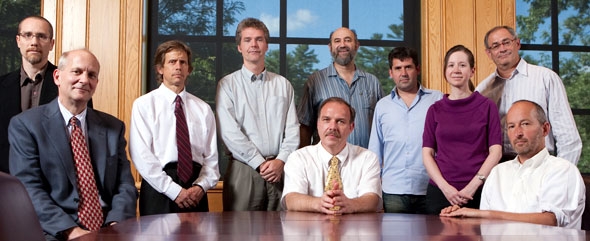Dartmouth has been designated as a Center of Cancer Nanotechnology Excellence (CCNE) with a five-year, $12.8 million grant from the National Cancer Institute (NCI). The CCNE places Dartmouth among top centers in cancer nanotechnology research nationwide and takes full advantage of Dartmouth’s culture of cross-disciplinary collaboration. CCNEs are tasked with integrating nanotechnology into basic and applied cancer research in order to provide new solutions for the diagnosis and treatment of cancer.
The CCNE brings together Thayer School of Engineering at Dartmouth, Norris Cotton Cancer Center at Dartmouth, and Dartmouth Medical School to focus on the common goal of using magnetic nanoparticles to destroy malignant tumors.

“While Dartmouth has multiple projects in cancer nanotechnology, the CCNE is focused specifically on magnetic hyperthermia cancer treatment,” says Ian Baker, the Sherman Fairchild Professor of Engineering and CCNE program director. “The treatment involves delivering nanoparticles to tumor cells and then applying an alternating magnetic field to heat the particles and destroy the tumor.” The CCNE deputy director is Keith Paulsen, the Robert A. Pritzker Professor of Biomedical Engineering.
In awarding the grant, NCI reviewers cited the Dartmouth CCNE for its leadership, its outstanding research team, and its highly integrated and interdependent projects.
“The Dartmouth CCNE is the result of our vision for the enormous potential of nanotechnology to improve cancer diagnostics and therapy, and Dartmouth’s unique ability to capitalize on that potential,” says Norris Cotton Cancer Center Director Mark A. Israel. “Our cancer nanotechnology working group brought together no less than 25 top-notch scientists, engineers, and physicians from across Dartmouth to advance this program.”
The Dartmouth CCNE will focus on breast and ovarian cancer, but the approach could potentially be used to treat many forms of cancer. “We know how to kill breast cancer cells,” says Professor of Engineering Tillman Gerngross, one of the project leaders on the grant, “But the challenge remains of how to do it without harming the rest of the body. There are four basic parts to this effort: creating new nanoparticles; enabling the particles to target cancer cells; assessing their effectiveness in vitro; and testing them in appropriate model systems. We took an engineering approach to analyze these pieces and put them together in a way that made sense. Other institutions may have some of these same pieces, but I believe this level of collaboration is just easier at Dartmouth.”
“The plan is to attach antibody fragments to the nanoparticles and then use imaging techniques to track the particles and make sure they’re getting to the tumor,” explains Baker. “The role of my work in materials science is to develop a new nanoparticle with an iron core that speeds up the heating process and results in faster, more effective, and safer treatment of the tumor.
“At the end of five years, we hope to have advanced to clinical trials,” adds Baker. Clinical trials test new medical approaches in patients, and are the final step in the process of developing new treatments for cancer.
“This award is the culmination of decades of cancer biology, therapy, and engineering research at Dartmouth,” says Jack Hoopes, professor at Dartmouth Medical School and Thayer School of Engineering and another of the grant’s project leaders. “The most impressive aspect is the wide array of talent assembled into one research effort. The fact that all 19 faculty investigators and more than a dozen graduate students understand and embrace their colleagues’ expertise—including basic and clinical cancer biology, protein and hyperthermia engineering, medical physics, biostatistics, and nanotechnology and materials science—is unique and key to the grant’s funding success. Medical nanotechnology research and application requires insight into many distinct fields of study. The ability to collaborate across the artificial separations of academic disciplines continues to be a Dartmouth focus and strength.”
As a CCNE, Dartmouth also becomes a member of the National Cancer Institute’s (NCI) Alliance for Nanotechnology in Cancer, which serves NCI as a national resource assembled to advance future work in cancer prevention, detection, diagnosis, and treatment.
“This project is a natural outgrowth of Thayer’s strategic focus on engineering in medicine—an effort we are pursuing with our colleagues in the medical school and cancer center,” says Thayer School Dean Joseph Helble, professor of engineering. “The MD/MS program, the new undergraduate major in biomedical engineering sciences, several key faculty hires, and grants such as this are all part of our effort to tackle complex problems in medicine through collaboration between engineers and medical scientists.“
Dartmouth CCNE Leadership
- Director: Ian Baker, the Sherman Fairchild Professor of Engineering; Senior Associate Dean, Academic Affairs
- Deputy Director: Keith Paulsen, the Robert A. Pritzker Professor of Biomedical Engineering; Professor of Radiology, Dartmouth Medical School; Director, Dartmouth Advanced Imaging Center, Dartmouth-Hitchcock Medical Center; Co-Director, Cancer Imaging and Radiobiology Research Program, Norris Cotton Cancer Center
- Eugene Demidenko, Research Professor of Community and Family Medicine (Biostatistics), Dartmouth Medical School
- Steven N. Fiering, Associate Professor of Microbiology and Immunology, and of Genetics, Dartmouth Medical School
- Jose Conejo-Garcia, Assistant Professor of Microbiology and Immunology and of Medicine
- Tillman U. Gerngross, Professor of Engineering, Thayer School; Co-founder and CEO, Adimab
- Karl Griswold, Assistant Professor of Engineering, Thayer School
- P. Jack Hoopes, Professor of Surgery and of Medicine (Radiation Oncology), Dartmouth Medical School; Adjunct Professor of Engineering, Thayer School; Director, Surgery and Radiation Research Laboratories; Co-Director, NCCC Cancer Nanotechnology Working Group
- Lionel D. Lewis, Professor of Medicine and of Pharmacology & Toxicology, Dartmouth Medical School
- Brian W. Pogue, Professor of Engineering, Thayer School; Dartmouth Dean of Graduate Studies
- Mary Jo Turk, Assistant Professor of Microbiology & Immunology, Dartmouth Medical School; Immunology and Cancer Immunotherapy Research Program, Norris Cotton Cancer Center
- John B. Weaver, Professor of Radiology, Dartmouth Medical School; Adjunct Associate Professor of Engineering, Thayer School
